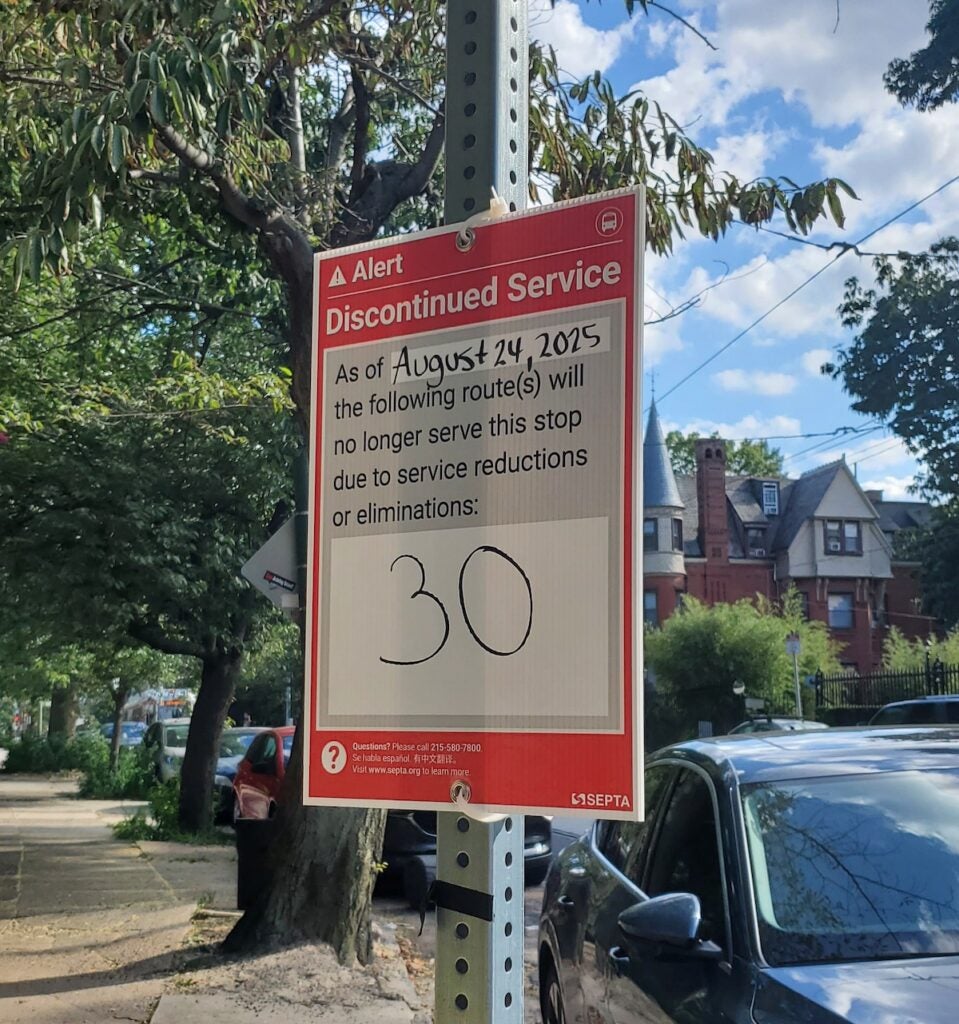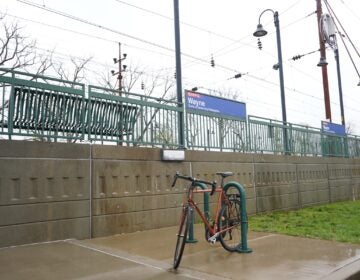West Philadelphia neighbors react to upcoming SEPTA service cuts
West Philly residents are voicing concerns about SEPTA’s proposed cuts, which would reshape how families, workers and community members move around the city.

Stephen Bronskill, coalition manager for Transit Forward Philadelphia. (Natalia Sanchez Loayza/WHYY)
Have a question about Philly’s neighborhoods or the systems that shape them? PlanPhilly reporters want to hear from you! Ask us a question or send us a story idea you think we should cover.
Stress. Fear. Outrage. Frustration. Anger. Then, hope — and resolve. Those are the emotions running through West Philadelphia as residents respond to SEPTA’s sweeping service cuts and reductions.
After the Pennsylvania state House voted down a Senate bill on Aug. 13 — a day before SEPTA’s deadline to reverse the new fall schedules— the agency said it will move forward with its plan starting Aug. 24.
This Sunday, SEPTA will eliminate 32 bus routes, shorten 16 more, and reduce service on a total of 88 bus, trolley, subway and regional rail lines. In West Philadelphia, routes 12, 30 and 31 will be discontinued.

PlanPhilly spoke with residents there to hear how the changes would affect their daily lives.
Keeping the community connected
Philadelphia’s transit system has been, as in the rest of the city, a lifeline for the neighborhoods west of the Schuylkill River. For community leaders like JJ Tiziou, an artist, massage therapist and block captain in Spruce Hill, the cuts feel like a threat to the city’s core.
“When I think of a city, I think of transit,” he said. “The more you invest in transit, the more you create opportunities for connection. There are exponential benefits when people can get to resources, to parks and green spaces, to health care, and can have an extra 10 minutes in their day … It’s just one of the very basic city infrastructure investments,” Tiziou explained.
Through his Walk Around Philadelphia project, which covers the entire city, Tiziou has seen firsthand the importance of connectivity. “We rely on SEPTA a million percent to get to our start and stop points,” he said. “Having walked the whole border of the city 15 times, I have a deep understanding of the scale and complexity of the region and have more of an appreciation for SEPTA’s network … If anything, it’s something I feel like we should be doubling down on.”
Morgan Andrews, an art curator at Studio 34 — a yoga studio and community space in the neighborhood — echoes the sentiment. “Public transportation connects all of us. A car is something that divides people. You’re in this little box by yourself,” he said.
Studio 34 has been in West Philadelphia since 2008 and has been connected to the city’s transit system from the start. “The name of the neighborhood is so contentious, right? Is it University City? Is it West Philly? Is it Cedar Park? But the thing that really everyone could agree on is there’s this trolley that goes right out front, the number 34 trolley. They called it Studio 34 after the trolley.”
The funders’ vision was to connect more people with this community space in Baltimore, one of West Philadelphia’s main avenues. If people wanted to take a class or attend an arts event, it was meant to be simple: “Use this trolley. Get on the 34 to go to Studio 34,” they would tell guests.
Getting to work
For those relying on SEPTA to get to their jobs, the cuts are more than an inconvenience. They are a potential disruption to daily life.
M. L. Mutrux, events and programming coordinator at Making Worlds Bookstore, commutes from South to West Philadelphia for every shift. “I take the 64 bus, basically from Walmart [by the Delaware river] to West Philly, here on Spruce and 48th,” they said. “With work, you have to know consistently how you’re going to get there.”
If the cuts take effect, one option for Mutrux is to ride a bike, “which I don’t want to do because I have ridden my bike to West. It’s a 30-minute bike ride, and the city is not safe for cyclists. So I’m really not looking forward to that. But I can’t be an hour late to work.”

The situation is so concerning for them that it’s making them reconsider the viability of their job. “I’m in a transition in my work that requires more responsibilities and more time from me. So now I have to seriously consider: Do I need to buy a car in order to continue developing in my career? It’s an incredible expense I don’t really want to take on,” Mutrux said.
Unlike Mutrux, who moved to Philadelphia last year, Carol Jenkins has lived in West Philly for over 40 years. A former political science professor, Jenkins is the 27th Ward Democratic leader in Philadelphia and recalls choosing the neighborhood precisely for its transit system.
“It was an attraction to me,” she said. “I walk across the street, and I get the 34 trolley. Dennis is my favorite trolley driver. He’s a Phillies fan, and we talk Phillies on the trolley. When I was teaching at Temple, I would get the trolley, switch at City Hall and take the sub. I could prepare my lecture notes on the trolley.”
Now, Jenkins worries about the current students at Temple who need to get to campus. “I think it’s appalling that our elected officials can just dismiss those difficulties. It’s their responsibility. It’s their obligation not to do that,” she said.
Living in Philadelphia — specifically, West Philadelphia — carried the promise of living in a connected part of the city. Many of the people WHYY News spoke with feel let down by that promise.
Mobility affects everyone
Transit cuts reach beyond the daily commute — they ripple through family life.
Mutrux notes, “I have a 4-year-old who uses the free Philly pre-K program … transit really impacts that. Sometimes my kid is coming from a 30-minute walk from his school, and it’s really nice to be able to get on a bus.”
Andrews also thinks about his family when he learns recent news about the service cuts. “I have my father, who’s aging and lives in the suburbs. It’s easy for me to take the regional rail to get to him. He’s blind, so he really relies on it to get into the city and out of the city to visit and do things that he needs to do,” he said.
All of that is now under threat for Andrews and his father. “That’s what the SEPTA cuts will do. They will rip families apart. I’ve been ripped apart from my family. My blind father won’t be able to get into the city to visit me. And me, as a person who’s going blind, won’t be able to get out there to visit him. We will see less of each other. It’s awful. It’s shameful. It’s an embarrassment,” he added.
Public transit availability is also an accessibility issue, Mutrux emphasized. “My bus stop is right next to a senior living facility, and all of those folks are using the bus to get to parts of town that you can’t get to walking. I’m really concerned because I really have no idea how people are going to get where they need to go.”
Residents take action
West Philadelphia residents and advocates are mobilizing to prevent the cuts and channel their outrage into action.
Stephen Bronskill, a Spruce Hill resident and coalition manager for Transit Forward Philadelphia, a coalition of 37 organizations advocating on transportation issues in Philly, is one of them.
“Over 250 people have volunteered in the last couple of months, often waking up early in the morning to stand on train platforms, urging people to step up and take action. Over 30,000 folks have written letters to their elected officials. The silver lining is seeing so many people who care about our community,” he said.

One of the ideas from Transit Forward Philadelphia to get residents involved was a bike sticker race. “You may have seen those red cancellation signs that say, ‘Hey, your route is being canceled,’ but there’s not a lot of other information,” he said. “We put a sticker on it saying, ‘This is how you call your elected officials.’ We had people race to put as many as they could in an hour. It was really fun. 50 bikers, many from West Philly, came out,” Bronskill explained.
Like Bronskill, block captain Tiziou is also hopeful that an agreement can be reached before it’s too late. Tiziou emphasized the importance of persistence. “The big thing for me is for people to be in this for the long run,” he said. “I hope we figure this out now. But [remember] not to give up. Where we should be heading is more coverage, more frequency, more affordability.”
Meanwhile, neighbors like Morgan seem ready to take action. “I’m ready to go to Harrisburg. I’m ready to stand there with a white cane and dark glasses and say, ‘You people, what are you doing? You’re harming people. You’re limiting people who are already so limited. It’s infuriating,’” he said.


Get daily updates from WHYY News!
WHYY is your source for fact-based, in-depth journalism and information. As a nonprofit organization, we rely on financial support from readers like you. Please give today.







